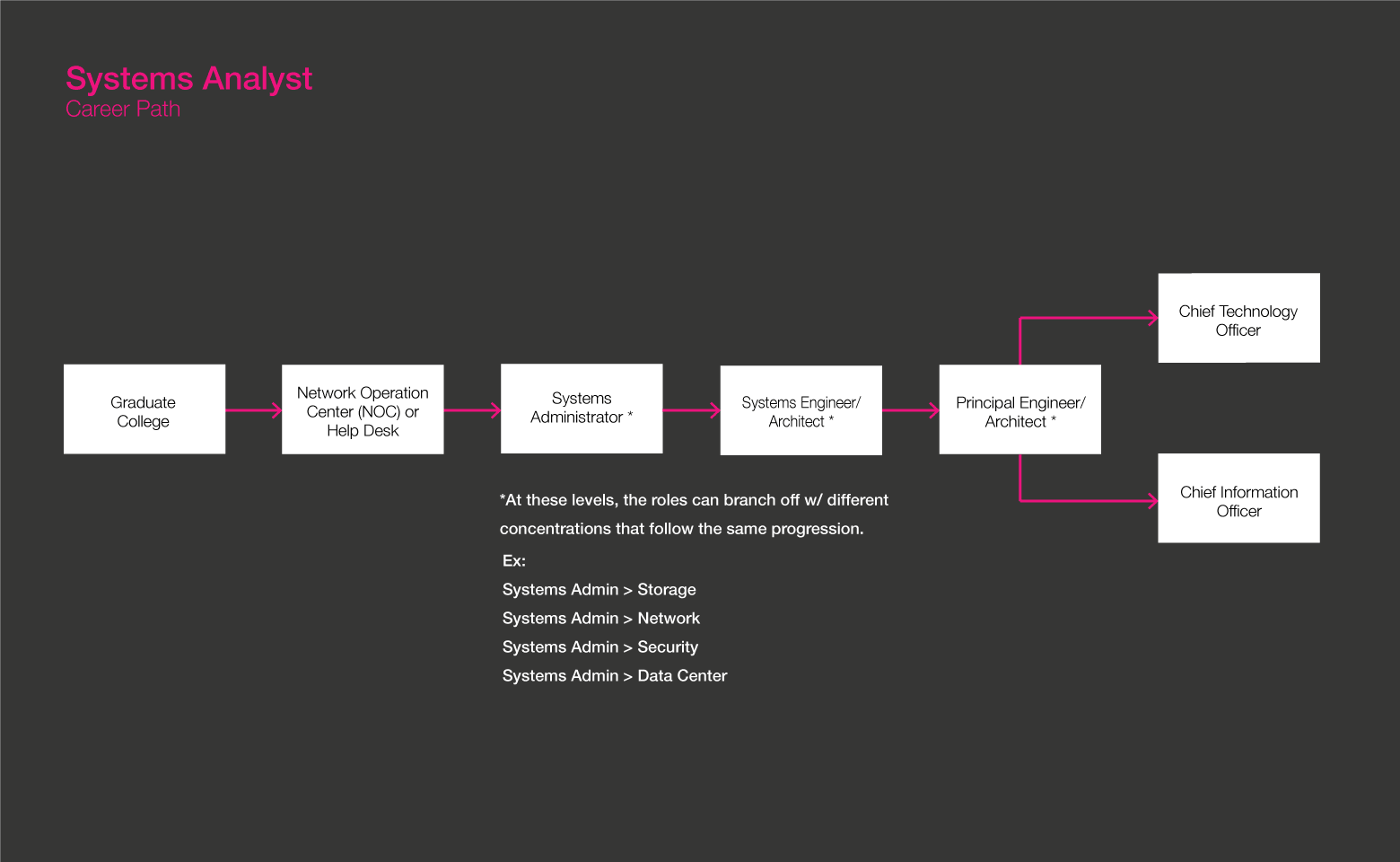الاضواء
Business Analyst, Systems Administrator, DevOps (developers + operators) Engineer, Principal Engineer, Technologist, Computer Systems Analyst, Systems Architect
Systems analysts study an organization’s current computer systems and procedures, and design solutions to help the organization operate more efficiently and effectively. They bring business and information technology (IT) together by understanding the needs and limitations of both.
- Being surrounded by really smart, talented, and creative people who like their job
- Facing challenges and gaining confidence from solving the issues at hand
- Consult with managers to determine the role of IT systems in an organization
- Research emerging technologies to decide if installing them can increase the organization’s efficiency and effectiveness
- Prepare an analysis of costs and benefits so that management can decide if IT systems and computing infrastructure upgrades are financially worthwhile
- Devise ways to add new functionality to existing computer systems
- Design and implement new systems by choosing and configuring hardware and software
- Oversee the installation and configuration of new systems to customize them for the organization
- Conduct testing to ensure that the systems work as expected
- Train the systems’ end users and write instruction manuals
Most computer systems analysts specialize in computer systems that are specific to the organization they work with. For example, an analyst might work predominantly with financial computer systems or with engineering computer systems. Computer systems analysts help other IT team members understand how computer systems can best serve an organization by working closely with the organization’s business leaders.
Computer systems analysts use a variety of techniques, such as data modeling, to design computer systems. Data modeling allows analysts to view processes and data flows. Analysts conduct indepth tests and analyze information and trends in the data to increase a system’s performance and efficiency.
Analysts calculate requirements for how much memory, storage, and computing power the computer system needs. They prepare flowcharts or other kinds of diagrams for programmers or engineers to use when building the system. Analysts also work with these people to solve problems that arise after the initial system is set up. Most analysts do some programming in the course of their work.
- Technical skills, pertaining to how a computer works physically and how it operates at a hardware and software level
- An understanding of computer systems architecture, operating systems and networking
- Communication skills to be able to explain technical issues to potentially non-technically oriented individuals
- Analytical skills for troubleshooting and improving pre-existing systems
- الإبداع
- Ability to improvise
- Perseverance when dealing with problems
- Quick reaction times and availability
- Any company / organization that relies on computer systems (which is the large majority nowadays) will need a systems analyst
- Can work within a company or run your own company and have multiple businesses as clients
- Freelance work is also an option
- Typically at the start of your career, you’ll have to be on-call at all hours, but eventually you’ll transition into a 9-5 schedule
- This entails long hours and a lot of reactionary jobs - this is especially true at companies where monetary transactions are based in online stores, so the longer systems are down the more loss said company incurs.
- Apart from reactionary work, lot of time is spent on the backend to prevent failures going forward,which tends to include deep-diving into a given system to gain a more complete understanding of its inner workings
- Push for relocation to get more subsidies and reduce the cost of production
- Company relocation leads to less vibrant economies in some areas compared to others and makes it harder to attract new talent into an industry.
- Toward cloud-based storage, in which one company pays another to use their public storage system rather than investing in their own physical storage databases.
- Enjoyed learning how a computer, software and the Internet as a whole works, instead of just playing computer games.
- Had a lot of time-consuming hobbies, which tends to mean that an individual has curious ambition and certain skill sets later required to be a system analyst.
- Systems Analysts can get started with a bachelor’s in computer science or information systems
- Advanced positions may require an MBA with a focus in information systems
- Per O*Net, 33% have a bachelor’s, 29% an associate’s, and 14% a master’s
- Systems Analyst summer internships are a great way to get hands-on learning experience
- There are numerous Systems Analyst-related certificates available, including:
- IEEE - Software Engineering Master Certification
- Microsoft - Programming in C# Certification
- Global Knowledge -
- Microsoft Certified Systems Engineer
- Professional Business Analyst Certificate
- Certified Information Systems Security Professional
- ISACA - Certified Information Security Manager
- (ISC)2 - Certified Information Systems Security Professional - Architecture
- There is a broad array of technical skills needed, including “performance tuning (computers, routers, programs and networks), programming languages, computer platforms, hardware capabilities, network structure and function, data structures, and computer security)
- Join a computer or audio-visual club
- Good way to get involved and learn more about underlying computer systems
- Taking computer / audio classes, particularly at the University level, to facilitate in depth learning
- Common class topics include business analysis, HR management, marketing, leadership, business technology, data analysis
- Systems analysts must also develop skills in critical thinking, problem-solving, management, and communications
- Programming skills aren’t always needed, but popular languages for Systems Analysts are SQL, Python, C, and Java
- Work on relevant certifications that will help you be competitive
- Participate in computer clubs and online communities to learn and gain experience
- Teach yourself skills that your degree curriculum doesn’t cover. Take short courses, watch tutorials, read books and blogs, and take part in discussion forms
- Apply to Systems Analyst intern jobs to gain real-world experience
- Check out Computer Science scholarships that help cover tuition so you can focus more on your studies!
- Keep track of your accomplishments via a working draft resume. Also maintain a list of contacts you may need to use as references later

- Visit your school’s career center so staff can offer help preparing your resume and practicing for interviews. You can also learn about upcoming job fairs
- Build profiles on job portals such as Monster, Indeed, Glassdoor, Zippia, as well as IT-related sites like Machine Hack, MLconf Job Board, Stack Overflow, AngelList, and DataJobs
- Let your LinkedIn network know you are seeking employment as a System Analyst
- If you don’t have a ton of work experience, apply for the jobs you do qualify for where you can learn and grow
- Move where the work is! States with the highest employment of Systems Analysts are California, Texas, Illinois, Florida, and New York
- 26% of Systems Analysts work for computer systems design organizations; 15% are in finance and insurance; the rest are in companies, information services, and government agencies
- Use Systems Analyst resume templates for inspiration but don’t just copy and past their wording
- Ask previous teachers, supervisors, and colleagues in advance if they’re willing to serve as personal references
- Prepare for interviews by reviewing Systems Analyst interview questions and sample answers
- Be yourself during interviews and see if the company is a good culture fit for you or not
- Being flexible with having an on-call position, especially in the beginning
- Once you’re working a 9-5, it’s more straightforward
- The ability to work on a team, especially in a production environment
- The computer system is expected to be working close to 100 percent of the time, and when a systems analyst is in charge of 3,500 computers scattered across various building, thing can get hectic
- Some parts can fail and not be a big deal, while others can be disastrous, so system analysts have to be an expert at prioritizing and organizing their efforts
المواقع الإلكترونية
- AFCEA International
- Association for Computing Machinery
- Center of Excellence for Information and Computing Technology
- CompTIA
- Computing Research Association
- IEEE Computer Society
- Institute for Certification of Computing Professionals
- International Institute of Business Analysis
الكتب
- Stay flexible, and be open to networking and making connections
- Don't be afraid to try something you don't know how to do because you'll learn how to do it, and in learning, you'll find out whether or not you like it and then you can move on
- Don't be afraid to switch jobs if it doesn't work
ملف الأخبار

وظائف مميزة

الدورات والأدوات عبر الإنترنت








